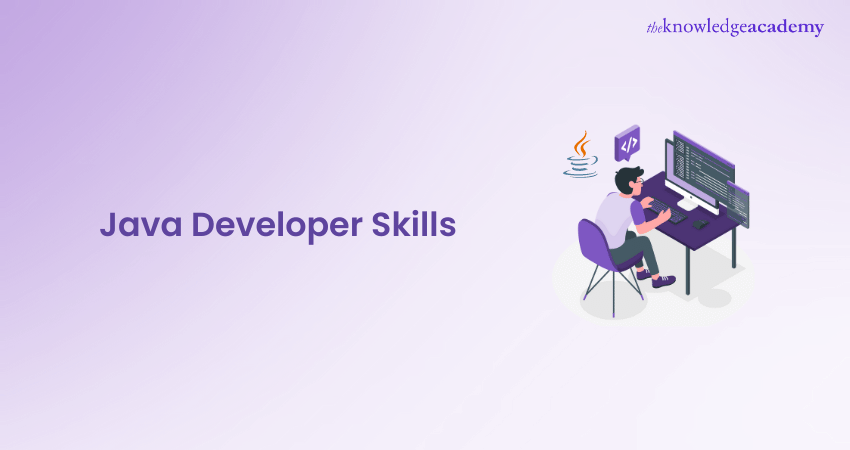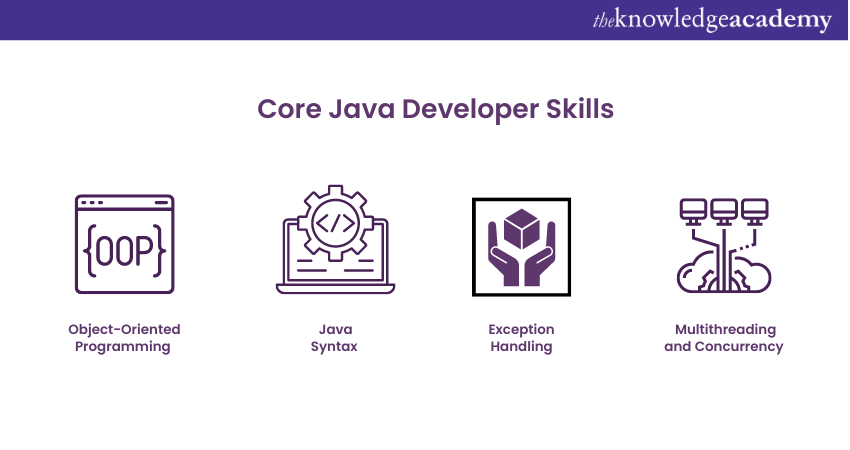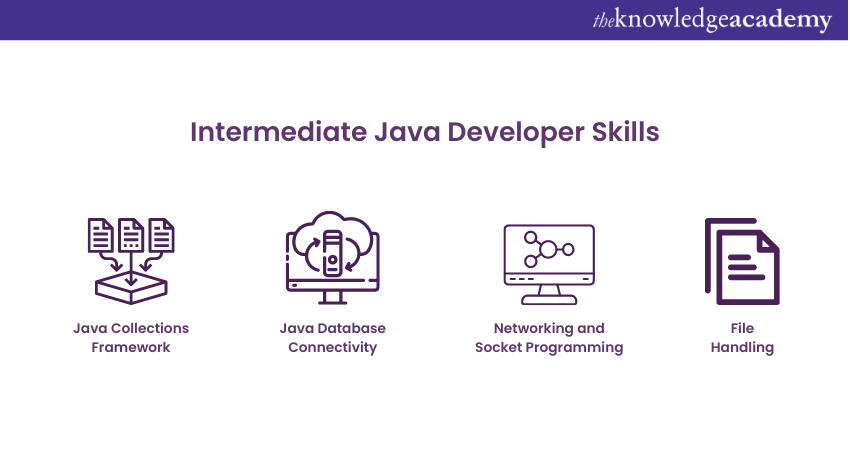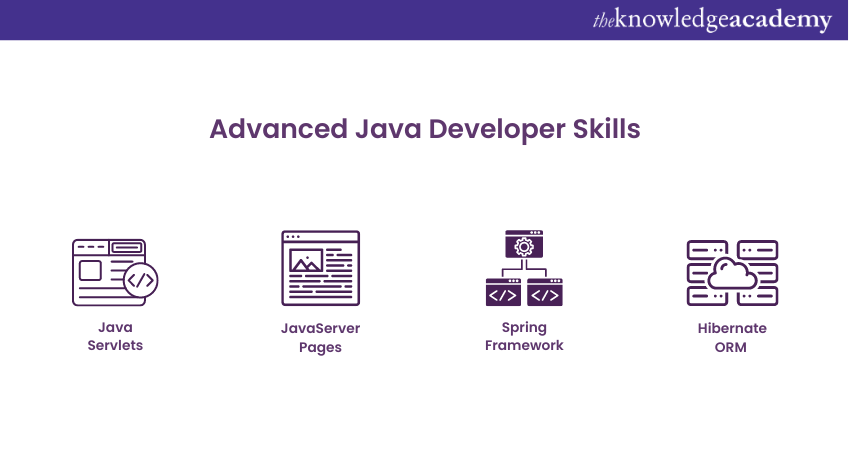We may not have the course you’re looking for. If you enquire or give us a call on 01344203999 and speak to our training experts, we may still be able to help with your training requirements.
Training Outcomes Within Your Budget!
We ensure quality, budget-alignment, and timely delivery by our expert instructors.

Java is a versatile programming language widely used for building robust and scalable applications. Acquiring Java Developer Skills can allow you to work on various projects, from Web Development to mobile apps and enterprise software. To excel in this field, you must acquire core, intermediate, and advanced skills.
According to the 2022 Developer Survey by Stack Overflow, Java is the sixth most popular language, with 33.27% of developers worldwide using it. This demonstrates the popularity of Java and its bright scope in the development industry. Here, we discuss essential Java Developer Skills and provide insights to help you enhance your Java skills and excel in your development career.
Table of Contents
1) Who is a Java Developer?
2) Skills Required for Java Developer
3) Intermediate Java Developer Skills
4) Advanced Java Developer Skills
5) Conclusion
Who is a Java Developer?
A Java Developer is a professional who designs, develops, and manages applications using the Java programming language. They write code to build software that can run on various platforms, such as desktops, servers, and mobile devices. Their responsibilities include:
a) Creating new features and troubleshooting issues
b) Optimising performance
c) Ensuring the software is secure and efficient
Java Developers often work on web applications, enterprise-level systems, and Android apps. They collaborate with other developers, designers, and stakeholders to deliver high-quality software solutions that meet user needs and business goals.
Java Developers often use Integrated Development Environments (IDEs) like Eclipse or IntelliJ IDEA to write and debug code. Knowledge of frameworks like Spring and Hibernate is also crucial for building robust applications.
They may also be involved in testing, deploying, and maintaining applications, ensuring they perform well and remain bug-free over time.
Skills Required for Java Developer
A Java Developer needs diverse skills to design, develop, and maintain software applications effectively. They must be proficient in various technical skills to meet the demands of their role. Below are the required Java Developer key skills:
Core Java Developer Skills
These are the fundamental skills that every Java Developer should possess. They include knowledge of Object-Oriented Programming (OOP), Java syntax, exception handling, and multithreading/concurrency, forming the building blocks for Java Development.

Object-Oriented Programming (OOP)
OOP is a fundamental concept in Java and other programming languages. It provides a modular and structured approach to software development. With OOP, you can organise code into reusable components called objects, which represent real-world entities. Objects have properties (attributes) and behaviours (methods) that define their characteristics and actions they can perform.
In Java, you can create classes to define objects and their behaviour. Encapsulation, inheritance, polymorphism, and abstraction are the four pillars of OOP. Encapsulation allows data hiding and protects it from unauthorised access. Inheritance enables code reuse and establishes an "is-a" relationship between classes. Polymorphism allows objects of different classes to be treated interchangeably. Abstraction focuses on defining interfaces and hiding implementation details.
Java Syntax
Understanding Java syntax is a core skill for any Java Developer. Java’s syntax is influenced by C and C++, making it familiar to many programmers. The syntax defines the rules for writing correct Java code and includes the structure and format of statements, expressions, and other elements.
A Java program is composed of classes and methods. A class serves as a blueprint for objects, encapsulating data and behaviors. Methods define the actions an object can perform. Variables store data values and must be declared with a specific type, such as int, String, or boolean.
Mastering Java syntax allows developers to write clear, efficient, and maintainable code, which is essential for building robust applications. Understanding these basic constructs and rules is foundational for any Java Developer aiming to create functional and effective software.
Try our Introduction To Java EE Training Course and learn about Java API in detail!
Exception Handling
Exception handling is crucial in Java to manage errors and unexpected situations during program execution. An exception is an event that disrupts the normal flow of a program. Java provides a robust exception-handling mechanism to catch and handle exceptions gracefully using try-catch blocks.
In a try-catch block, you enclose the code that may throw exceptions. If an exception occurs within the try block, it is caught by the corresponding catch block, which specifies the exception type to handle. You can have multiple catch blocks to handle different types of exceptions.
Additionally, Java provides the final block, which executes regardless of whether an exception occurs. The final block is useful for performing cleanup actions, such as closing files or releasing resources.
Multithreading and Concurrency
Multithreading and concurrency are essential concepts in Java for building responsive and efficient applications. Multithreading allows executing multiple threads (independent units of execution) concurrently within a single program. Java provides built-in support for multithreading through the Thread class and the Runnable interface. By creating multiple threads, you can perform tasks simultaneously, improving the overall performance of your application.
Concurrency refers to the ability of multiple threads to access shared resources and synchronise their actions. Java provides synchronisation mechanisms like locks, semaphores, and monitors to ensure thread safety and prevent race conditions. With multithreading and concurrency, you can achieve parallelism, responsiveness, and better resource utilisation in your Java applications.
Web Frameworks
Proficiency in web frameworks is crucial for a Core Java Developer, as these tools simplify and expedite the development process. Frameworks such as Spring MVC, Struts, and JSF (JavaServer Faces) provide pre-built components and configurations that help developers in creating robust, scalable, and maintainable web applications.
Knowledge of these frameworks allows developers to implement MVC (Model-View-Controller) architecture, manage dependencies, and handle various web technologies seamlessly. Mastery of web frameworks enhances a developer's ability to build feature-rich applications efficiently, ensuring code consistency and reducing the likelihood of errors.
Application Containers
Understanding application containers is essential for Core Java Developers. Application containers like Apache Tomcat, Jetty, and JBoss provide the environment in which Java web applications run. These containers manage the lifecycle of web components, handle resource allocation, and provide security features.
Developers need to know how to deploy applications in these containers, configure them, and troubleshoot issues. Mastery of application containers ensures that Java applications run smoothly, are scalable, and adhere to best practices in deployment and management.
Unit Testing
Unit testing is a fundamental skill for Core Java Developers. It ensures that individual components of an application work as intended. Familiarity with testing frameworks such as JUnit and TestNG is crucial for writing effective tests.
Developers write test cases to validate methods and classes' functionality, helping identify and fix bugs early in the development cycle. Unit testing improves code quality, reduces the risk of regression, and facilitates refactoring by providing a safety net of tests that verify existing functionality.
Mastering The Principles Of SOLID
Mastering the principles of SOLID is vital for Core Java Developers to write maintainable and scalable code. SOLID stands for Single Responsibility Principle, Open/Closed Principle, Liskov Substitution Principle, Interface Segregation Principle, and Dependency Inversion Principle.
These principles guide developers in designing systems that are easy to understand, modify, and extend. Adhering to SOLID principles helps create a robust architecture that minimises code dependencies and promotes code reuse. By following these principles, developers can ensure that their codebase remains clean, manageable, and adaptable to changing requirements.
Transform your coding skills with our Java Courses - sign up now!
Intermediate Java Developer Skills
Intermediate-level skills encompass more advanced topics, such as the Java Collections Framework, Java Database Connectivity (JBDC), networking/socket programming, and file handling, which expand developers' capabilities and enable them to work with more complex functionalities.

Java Collections Framework
The Java collections framework provides a comprehensive set of classes and interfaces for managing and manipulating collections of objects. It includes data structures like lists, sets, and maps and algorithms for searching, sorting, and iterating over collection elements. The List interface allows you to work with ordered collections like ArrayList and LinkedList. Sets, represented by the Set interface, store unique elements, while maps, implemented by the Map interface, associate keys with values.
Understanding the Java Collections Framework is crucial for efficient data management in Java applications. You can optimise memory usage, improve performance, and simplify your code by leveraging the appropriate collection classes and algorithms.
Java Database Connectivity
JDBC is a standard Java API for accessing relational databases. It provides classes and interfaces that enable Java applications to interact with databases using Structured Query Language (SQL). With JDBC, you can establish database connections, execute SQL queries, and retrieve or update data. The API supports various database management systems, including MySQL, Oracle, and PostgreSQL.
JDBC utilises drivers specific to each database vendor to establish connections and perform operations. It follows a step-by-step approach, involving creating a connection, creating a statement, executing queries or updates, and handling result sets. Understanding JDBC is essential for Java Developers working with databases, as it enables seamless integration between Java applications and relational databases.
Networking and Socket Programming
Networking and socket programming are vital for building networked applications in Java. Socket programming allows communication between two machines over a network using sockets representing endpoints for sending and receiving data. Java provides classes like socket and serversocket for creating network sockets and establishing connections. These classes allow you to develop client and server applications communicating over TCP/IP or UDP/IP protocols.
Networking in Java involves handling network protocols, such as HTTP, FTP, or SMTP, and implementing communication mechanisms like client-server architecture or peer-to-peer communication. By mastering networking and socket programming, you can develop robust networked applications, including web applications, client-server systems, and real-time data exchange applications.
File Handling
File handling is fundamental for reading from and writing to files in Java. Java provides classes like File, FileReader, FileWriter, and BufferedReader, among others, to perform file-related operations. You can create, delete, read, write, and manipulate files and directories with file handling. You can open streams to read data from files, write data to files, or perform more advanced operations like random access.
Understanding file handling is crucial for tasks like reading configuration files, parsing log files, or processing large data sets stored in files. By mastering file handling in Java, you can effectively work with files and directories, enabling you to build applications that interact with the file system.
Transform your development skills with our Java Programming course – register today!
Advanced Java Developer Skills

Advanced Java skills involve expertise in sophisticated areas of Java Development, like Java Servlets, JavaServer Pages (JSP), the Spring Framework, and Hibernate Object-Relational Mapping (ORM). These skills empower developers to build enterprise-level applications and leverage advanced frameworks and technologies.
Java servlets
Java servlets provide a server-side technology for building dynamic web applications. Servlets extend the capabilities of web servers by generating dynamic content and handling HTTP requests and responses. They act as the middle layer between web clients and the server, processing user input, interacting with databases, and generating dynamic HTML.
You can handle session management, URL mapping, form data processing, and more with Java Servlets. Servlets are portable across different web servers and platforms, making them a widely adopted technology for Web Development. Understanding Java Servlets allows you to develop robust and scalable web applications, providing a foundation for building interactive and data-driven websites.
JavaServer Pages
JSP is a technology that allows embedding Java code within HTML pages. JSP simplifies web application development by separating dynamic content from static HTML. It enables you to create dynamic web pages that generate dynamic content based on user input or database queries.
JSP pages are compiled into servlets behind the scenes, providing the flexibility of Java code while maintaining the simplicity of HTML markup. With JSP, you can leverage Java's rich features, access databases, and incorporate complex business logic directly into your web pages. Mastering JSP allows you to create interactive and dynamic web applications, providing a seamless user experience.
Spring Framework
The Spring framework is a powerful and widely adopted framework for building enterprise-level Java applications. It provides a comprehensive platform for developing Java-based enterprise applications. It also offers dependency injection, aspect-oriented programming, and declarative transaction management.
With Spring, you can modularise your application, promote loose coupling between components, and enhance testability and maintainability. It integrates various technologies and frameworks like Hibernate, JDBC, and JMS.
Spring's core container provides the foundation for dependency injection and inversion of control (IOC). It enables you to configure and manage beans, which are the fundamental building blocks of Spring applications. Mastering the Spring Framework empowers you to develop scalable and maintainable enterprise applications, promoting best practices and efficient development processes.
Hibernate ORM
Hibernate is a popular ORM framework for Java. It simplifies database access and manipulation by mapping Java objects to database tables. With Hibernate, you can work with object-oriented code and perform Create, Read, Update and Delete (CRUD) operations on databases without writing SQL queries explicitly.
Hibernate provides a high-level and intuitive API for interacting with databases, handling transactions, and managing object relationships. It abstracts the underlying database details, allowing you to focus on business logic rather than low-level database operations. By understanding Hibernate ORM, you can improve productivity, ensure data consistency, and reduce the complexities of working with relational databases.
Join our Introduction to Java EE Training Course and master Java API!
Soft Skills for Java Developers
Soft skills are as essential as technical skills for Java Developers to thrive in their roles. These skills enhance collaboration, problem-solving, and effectiveness in a professional setting. Below are some of the key soft skills that every Java Developers should cultivate:
Teamwork
Teamwork is crucial for Java Developers, as most projects require collaboration with other developers, designers, Project Managers, and stakeholders. Effective teamwork involves actively participating in discussions, sharing knowledge, and supporting colleagues to achieve common goals.
It also means being open to feedback and adapting one’s approach for the team's benefit. Good teamwork fosters a positive work environment, enhances productivity, and leads to the successful completion of projects.
Ready to Learn New Things
The technology landscape is constantly evolving, making a readiness to learn new things an essential trait for Java Developers. This involves staying updated with the latest programming languages, frameworks, tools, and best practices.
Continuous learning helps developers improve their skills, stay competitive in the job market, and contribute more effectively to their projects. By embracing lifelong learning, Java Developers can innovate and adapt to changing technological demands.
Communication Skills
Communication skills are indispensable for Java Developers, enabling them to articulate ideas clearly and collaborate effectively with both technical and non-technical team members. Strong verbal communication is necessary for meetings and presentations, while written communication is crucial for documenting code and writing reports.
Effective communication ensures that requirements are understood, feedback is exchanged constructively, and project goals are aligned. By honing their communication skills, Java Developers can enhance teamwork and ensure smooth project execution.
Conclusion
Mastering Java Developer Skills is crucial for success in the tech industry. Core Java Developer Skills provide a foundation, while intermediate skills expand capabilities. Advanced skills like Java Servlets, JSP, Spring Framework, and Hibernate ORM enable sophisticated applications. Embracing tools and continuous learning ensure competitiveness in Java Development.
Master Software Engineering fundamentals with Java Programming and Software Engineering Fundamentals Training- sign up today!
Frequently Asked Questions

Learn Java if you want to build large-scale enterprise applications or Android Development or require a scalable language with robust performance. Opt for Python if you prefer simplicity and rapid development and are also interested in Web Development, Data Science, or automation.

Yes, being a Java Developer is a good career. Java is widely used in enterprise environments, web applications, and Android Development. It provides various opportunities alongside a steady work-life balance.

The Knowledge Academy takes global learning to new heights, offering over 30,000 online courses across 490+ locations in 220 countries. This expansive reach ensures accessibility and convenience for learners worldwide.
Alongside our diverse Online Course Catalogue, encompassing 17 major categories, we go the extra mile by providing a plethora of free educational Online Resources like News updates, Blogs, videos, webinars, and interview questions. Tailoring learning experiences further, professionals can maximise value with customisable Course Bundles of TKA.

The Knowledge Academy’s Knowledge Pass, a prepaid voucher, adds another layer of flexibility, allowing course bookings over a 12-month period. Join us on a journey where education knows no bounds.

The Knowledge Academy offers various Java Courses, including the Java Programming and Java Swing Development Training, and Java Engineer Training. These courses cater to different skill levels, providing comprehensive insights into Java Developer Salary.
Our Programming & DevOps Blogs cover a range of topics related to Java, offering valuable resources, best practices, and industry insights. Whether you are a beginner or looking to advance your Programming & DevOps skills, The Knowledge Academy's diverse courses and informative blogs have got you covered.
Upcoming Programming & DevOps Resources Batches & Dates
Date
 Java Programming
Java Programming
Mon 20th Jan 2025
Mon 3rd Mar 2025
Mon 12th May 2025
Mon 14th Jul 2025
Mon 22nd Sep 2025
Mon 17th Nov 2025







 Top Rated Course
Top Rated Course



 If you wish to make any changes to your course, please
If you wish to make any changes to your course, please


